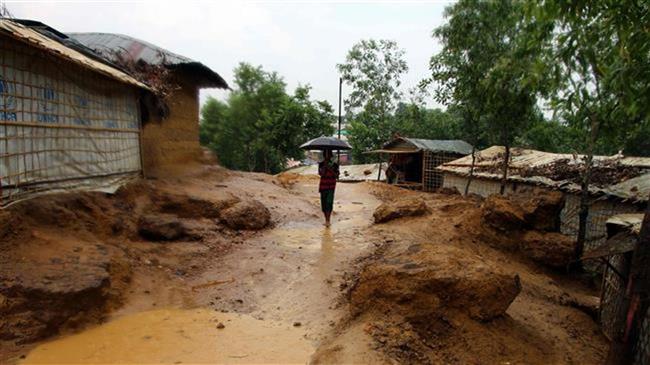
RNA - More than 700,000 Rohingya Muslims have fled state-sponsored violence in Myanmar to southeast Bangladesh in the past nine months, joining an estimated 200,000 others who were already there.
The looming monsoon season is predicted to pose the most serious threat since the Muslims were violently expelled from the northwestern state of Rakhine in Myanmar.
According to the Bangladesh Meteorological Department, the rains typically begin in April and peak in July.
Stranded in the Cox’s Bazar district in southeastern Bangladesh, the Rohingya refugees are living in bamboo and plastic shacks on unstable hills, being extremely vulnerable to disease and disaster in a part of the country that records the heaviest rainfall.
“Our families would be killed. There are children everywhere around here. We constantly fear that rain could trigger a landslide,” a 53-year-old refugee told AFP on the steep embankment where he lives with nine family members in a bamboo structure.
The death of a young girl in a torrent of mud and rock this month has already heightened fears of a greater tragedy.
“We could literally have lives lost as people slide down hillsides and valleys are flooded with water,” Kevin J. Allen, the head of the United Nations refugee agency’s operations in Cox’s Bazar, told AFP. “They could face yet again another emergency, this time driven by mother nature.”
Additionally, the Cox’s Bazar district, where the refugee camps are mostly concentrated, has been battered by cyclones for three years in a row and has been beset by astonishing devastation in the past.
According to Press TV, Abdur Rahman, the acting district administrator of Cox’s Bazar, said mosques and community centers in the district could shelter only 150,000 people at times of emergency.
“But if there is a big cyclone, and all these people need relocating, there is not a system for that yet. It is not possible to shift one million people,” he added.
Bangladesh is also racing to prepare new homes on a nearby island, called Bhasan Char, before the monsoons arrive.
Monsoon rains wreak havoc every year in Cox’s Bazar and the adjacent Chittagong Hill Tracts, a tropical forest zone home to wild elephants. Last season, heavy rain triggered landslides in the tract region, killing 170 people.
The Rohingya refugees have fled a systematic campaign of violence in their native Myanmar, where the majority-Buddhist government quietly approved a military crackdown on the Muslims.
Thousands were killed and hundreds of thousands were uprooted in that campaign.
847/940